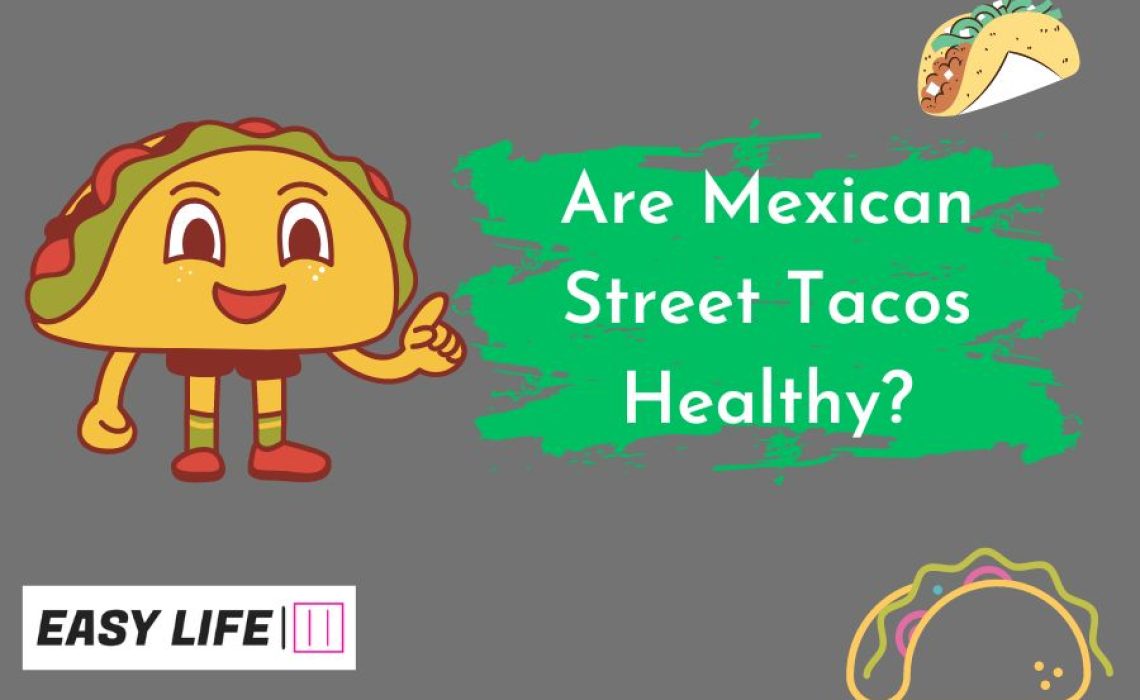Mexican street tacos are a culinary delight that has captured the hearts and taste buds of people worldwide. These small, flavorful bundles are a staple of Mexican cuisine and are quickly becoming a popular food choice in many other countries. However, as with any popular food, there are often questions about its nutritional value and healthiness. In our increasingly health-conscious society, it’s essential to evaluate our food choices and understand their impact on our well-being. This blog post aims to explore the health aspects of Mexican street tacos, considering their ingredients, preparation, and how they can fit into a balanced diet.
Mexican street tacos, known for their authenticity and rich flavours, are a traditional staple in Mexican cuisine. They’re typically smaller than the tacos you might find in an American-style Mexican restaurant, designed to be eaten in a few bites, and are traditionally served on soft corn tortillas.
The basic structure of a street taco consists of a soft corn tortilla, a filling, and simple, fresh toppings. The filling is usually a type of grilled or stewed meat such as carne asada (grilled beef), al pastor (marinated pork), carnitas (slow-cooked pork), or pollo (chicken). However, there are also versions with fish, shrimp, or even vegetarian and vegan options.
Toppings are typically minimal to allow the flavour of the meat to shine through. Common toppings include chopped onions, fresh cilantro, a squeeze of lime, and perhaps a dollop of salsa or guacamole. Unlike some of their American counterparts, Mexican street tacos usually don’t include cheese, sour cream, or lettuce.
Each region in Mexico has its own unique variation of street tacos, reflecting the diversity of the country’s culinary traditions. Despite their differences, all street tacos share a common characteristic: they are simple, unpretentious, and packed with flavour.
The nutritional content of Mexican street tacos can vary significantly depending on the ingredients used. However, let’s break down a typical street taco to give you a general idea.
A typical street taco consists of:
The question of whether tacos are good for you or not depends largely on their ingredients, how they’re prepared, and how they fit into your overall dietary habits.
When it comes to Mexican street tacos, they can indeed be a healthy choice if made with lean proteins, fresh toppings, and served on a whole grain corn tortilla. Here’s why:
Making healthier tacos involves careful selection and preparation of ingredients. Here are some tips to guide you:
Table of Contents
Toggle1. What Are Mexican Street Tacos?
2. Nutritional Breakdown of Mexican Street Tacos
- Corn Tortilla: A standard small corn tortilla (about 6 inches in diameter) contains around 60-70 calories. Corn tortillas are also a good source of fibre and contain small amounts of protein and fat.
- Meat Filling: The type of meat used can significantly impact the calorie content. For instance, a serving of grilled chicken (around 2 ounces for a street taco) may contain approximately 60-70 calories, while the same amount of carne asada might have around 90-100 calories. Carnitas, which are often cooked with fat, can be higher in calories.
- Toppings: Fresh toppings like chopped onions and cilantro add minimal calories (usually less than 5 per serving). A squeeze of lime adds virtually no calories. However, additional toppings like salsa or guacamole can add more. A tablespoon of salsa adds about 5 calories, while the same amount of guacamole (which is high in healthy fats) might add around 25 calories.
3. Are Tacos Good For You?
- Protein: The meat in street tacos serves as a good source of protein, which is essential for building and repairing tissues in your body. Chicken, fish, and lean cuts of beef are especially good options.
- Fibre: Corn tortillas are made from whole grain and are a good source of dietary fibre, which aids digestion and can help control blood sugar levels.
- Vitamins and Minerals: Fresh toppings like onions, cilantro, and salsa can provide a variety of vitamins and minerals. For instance, cilantro is rich in vitamins A and C, while onions provide Vitamins C and B6.
- Type of Tortilla: The choice between corn and flour tortillas can impact the healthiness of your tacos. Corn tortillas are usually smaller, lower in calories, and contain more fibre than flour tortillas. They’re also gluten-free, which is a plus for those with gluten intolerance.
- Choice of Protein: The type and preparation of protein used can greatly influence a taco’s healthiness. Grilled chicken, fish, or lean cuts of beef are healthier options compared to fattier meats like carnitas. Vegetarian options, like beans or grilled vegetables, can also be a healthy choice.
- Toppings: Fresh toppings such as cilantro, onions, and tomatoes add flavour without adding many calories or unhealthy fats. However, high-calorie toppings like cheese, sour cream, and even guacamole (despite their healthy fats) can quickly increase the calorie and fat content of a taco if not used in moderation.
- Cooking Method: Grilled or baked meats are healthier than fried or batter-coated options. Also, the amount and type of oil used for cooking can significantly influence the calorie and fat content.
- Portion Size: Despite their small size, the calories in street tacos can add up quickly if you consume several at once. Portion control is crucial to keep your meal within a healthy calorie range.
- Sauces and Extras: While salsa and other sauces can enhance the flavour of a taco, they can also add significant amounts of sodium, sugar, and calories. It’s important to use such additions sparingly.
5. How to Make Healthier Tacos
- Opt for Lean Proteins: Choose lean meats like chicken, fish, or lean cuts of beef. If you prefer plant-based proteins, black beans or grilled vegetables are excellent choices. Avoid fried or battered proteins to reduce calorie and fat content.
- Choose Corn Tortillas: Corn tortillas are usually smaller, lower in calories, and higher in fibre than their flour counterparts. They’re also whole grains, which is beneficial for digestive health.
- Use Fresh Toppings: Fresh vegetables like lettuce, tomatoes, onions, and cilantro not only add flavour and crunch but also provide valuable nutrients and fibre. Avoid high-calorie toppings like cheese and sour cream, or use them sparingly.
- Add Flavor with Salsa: Salsa can be a great way to add flavour without many calories. Opt for fresh, homemade salsa to avoid added sugars and preservatives that are often found in store-bought versions.
- Mind the Guacamole: While avocado is a great source of healthy fats, it is also high in calories. Use guacamole sparingly, or consider using sliced avocado instead to better control the portion size.
- Cooking Method: Choose grilling or baking over frying to reduce the fat content. If you’re cooking your protein on the stove, use a minimal amount of oil.
- Portion Control: Remember, even the healthiest taco can contribute to weight gain if eaten in excess. Stick to one or two tacos per meal to avoid overeating.
- Be Mindful of Sodium: Processed foods and certain seasonings can be high in sodium, which can contribute to high blood pressure if consumed in excess. Make your taco seasoning to control the sodium content.










1 thought on “Are Mexican Street Tacos Healthy? A Nutritional Guide”
Pingback: Top 10 American Foods with Delicious Recipes - 2023